#pilar quintana
Text
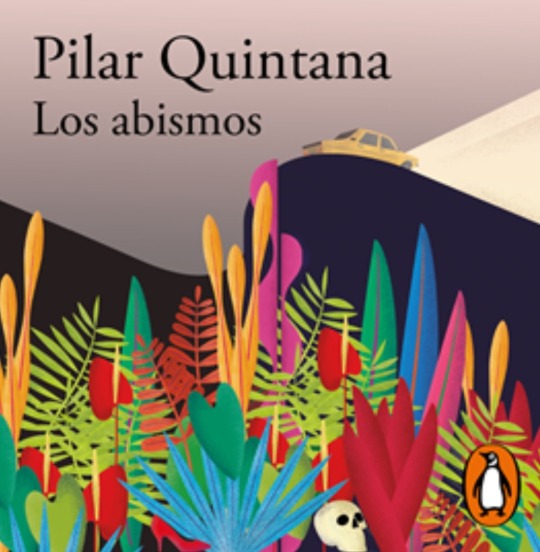
En esta oportunidad les daré mi opinión sobre el libro "Los Abismos" de la escritora Pilar Quintana.
Me pareció un libro interesante, mezcla muchas emociones y situaciones que hacen que se sumergas en la lectura, más que todo el inicio, me entretuvo mucho leyendo y hacía que mi tiempo pasara rápido. Aunque después de la mitad me empecé a desinteresar ya que me confundí bastante. Igual creo que es un muy buen libro, Recomendado. 🫦
2 notes
·
View notes
Text

Pilar Quintana’s Los abismos and echinacea tea because I am sick. Los abismos is a fast reas because the language is simple and there’s not a lot of it per page, but it’s a slow read because I’m halfway through and still not that interested in what’s happening - or not happening, as the case may be. I have hope though!
#adult booklr#tomes and tea#literatura latinoamericana#pilar quintana#los abismos#latin american literature
2 notes
·
View notes
Text
My Favorite Fiction I've Read in 2023
Another year. Here are my favorite fiction reads of 2023, and as always, fiction is all that really counts.
‘Glassworks’ by Olivia Wolfgang-Smith – ‘Glassworks’ is an intriguing and endlessly fascinating quirky family saga with one family member of each of four generations involved with working with glass in one form or another. The situations that Olivia Wolfgang-Smith creates for her…

View On WordPress
#Alba de Cepedes#Benjamin Labatut#Daniel Mason#Donal Ryan#Elizabeth von Arnim#Georgi Gospdinov#Gwendoline Riley#Olivia Wolfgang-Smith#Paul Harding#Paul Murray#Pilar Quintana#Stephen Wright
0 notes
Text
Title: The Bitch
Author: Pilar Quintana
Translator: Lisa Dillman
Publication Year of Translation: 2020
Publisher: World Editions
Genre: fiction
This was such a fascinating and disturbing read, especially in the way it reframes what motherhood can look like. The protagonist, Damaris, is a childless woman who adopts a stray female dog that she cares for like a human child to the point of obsession. While this sounds charming, the book is anything but, as it dives into the question of what it means to be a mother (and even what it means to be a bitch), as well as the deep issues that Damaris projects onto the dog that leads to terrible events.
Quintana doesn't shy away from describing the uglier aspects of human nature, such as the way jealousy, insecurity, and anger can consume us entirely. As a result, The Bitch definitely reads as more ruthless to the point of some probably finding the book completely cruel. Much to think about, but it's definitely not for the faint of heart (nor would it be a book I'd recommend for animal lovers, especially dog lovers). I didn't love or hate this, and if there's one complaint I have, it's that I wish some ideas were fleshed out a bit more.
Content Warning: animal death, animal cruelty, infertility, child death
0 notes
Text
FROM LOS ABISMOS BY PILAR QUINTANA
Mom suggested we go for a walk. She never went out with me and dad in Cali, so I looked at her surprised.
“What's so weird about that?” she asked.
We pulled on jeans, t-shirts, and rubber boots and tied sweaters around our waists in case it got cloudy and cold. Then, the two of us went up the stone drive, opened the black steel gate, and stepped out onto the unpaved road.
We walked slowly, looking at the houses, old and new, built of brick or wood, with large and small windows, sloped or flat roofs. There were all different kinds and they had gardens filled with flowers and fruit trees, pine hedges from behind which dogs barked at us or wagged their tails.
We crossed paths with another pair of pedestrians — old people with hats and walking sticks — a peasant hauling a heavy load on his shoulders, and a parade of young revelers carrying a giant boombox with music in English and passing around a bottle of aguardiente.
We saw a flock of green parakeets with blue markings around their eyes, a lone cow grazing on a treeless plot, and two gorges with high crags and noisy waters like an angry crowd.
Next, we came to a stretch of woods where the world got darker. There were trees weighed down with moss, big-leaved plants, fallen trunks rotting on the ground, and a light post consumed by a rust-like orange fuzz. A curve followed and at the end of the curve, a cliff. We drew closer. Slowly, uncertain. Skinny trees gripped the mountain’s rocky face, and just after that the land dropped off as if split by an axe.
I felt very small — like the baby girl looking out at our apartment’s staircase from behind the safety gate, but now without the gate. Me, with nothing more than my body, at the edge of an actual cliff. The canyon was narrow at that point and, down there, the river, which collected streams and rivulets from the mountain, was covered with vegetation, an untamed jungle.
I thought about dead women. Leaning over the cliff was like looking into their eyes. Into the eyes of Gloria Inés, fiery as a mare and then, later, smashed against the sidewalk. I looked up at my mom, who was, like me, bending toward the abyss.
“We’d better head back,” she said.
From Los Abismos by Pilar Quintana, pp. 151-153, translated unofficially by books lozano, 2021
#pilar quintana#los abismos#colombian literature#colombia#novel#translation#my translation#literature in translation#women authors#colombian#cali#la perra
1 note
·
View note
Text
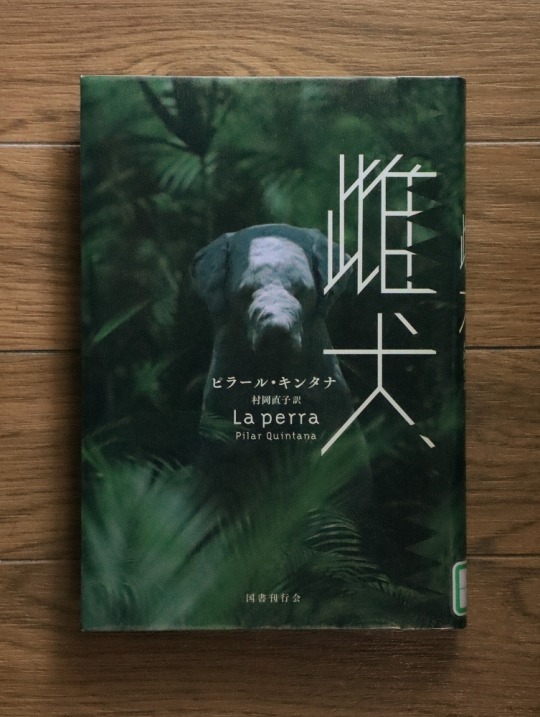
ピラール・キンタナ、村岡直子訳『雌犬』(国書刊行会)
子供ができなかったダマリスは、知り合いからもらった子犬をわが子のようにかわいがるが……。海に面した辺鄙な村は過酷な自然に囲まれ、貧困と飲酒とドラッグと暴力が蔓延している。主人公は孤立無援。陰鬱。
装幀:アルビレオ 装画:POOL
1 note
·
View note
Text
Introducción
Problema y pregunta de investigación.
En 2010, Eloy Fernández Porta, un escritor y ensayista español, publica Afterpop: la implosión de la literatura mediática. En este libro, Fernández Porta propone una crítica literaria que dé cuenta de la literatura que surge en el siglo XXI; particularmente, se pregunta “¿qué viene después de lo pop?” (Apablaza, 2007), haciendo alusión al surgimiento de la figura pop del escritor que aparece durante el siglo XX. La pregunta emerge de una crítica a la exacerbación de la figura del autor que sobrevino a partir de su mediatización en la televisión en las décadas de 1960 y 1970: “su conversión en personajes, con una actitud y anecdotario que pasa a ser dominio incluso de quienes poco o nada han leído de sus obras” (Morán, 2018, p. 42). El autor convertido en figura pop asiste a la disolución de oposiciones como las de alta y baja cultura o lo normal y lo pop que trae el caos de la cultura de consumo, nivelando esas oposiciones y haciendo imposible la pretendida distinción que aún se plasmaba en la ironía de lo pop del siglo XX. Disolución de la que surge, entonces, lo afterpop.
Lo anterior, en consideración a que, como analiza Carmen Morán Rodríguez, “Aunque en los años 70 se dio al autor por muerto, muchas han sido las voces que en los últimos años han reclamado revisar su certificado de defunción” (2018, p. 40). A diferencia de una concepción generalizada de la internet como el último paso en la desaparición postestructuralista del autor, Morán propone a la internet como un lugar de creación y posicionamiento de los autores: “[...] consideramos que Internet constituye la palestra idónea en la que culmina una visibilización del autor que nunca había llegado a morir y que desde finales del siglo XIX ha encontrado múltiples maneras de hacerse presente” (p. 40). De hecho, Morán Rodríguez afirma que “hay en la actualidad más síntomas de la salud de la categoría autorial” (2018, p. 40) y, por ello, dice que se manifiesta en huellas de esa categoría, de la cual surge la huella visual personal, la cual se refiere a la conformación del autor en su imagen.
Para este caso de estudio, dicha huella que se manifiesta en la presencia pública del autor resulta de especial interés para comprender la manera en que un autor crea su presencia para mantenerse activo y visible para el público. Carmen Morán Rodríguez destaca que es en internet y a través de las redes sociales que el autor ha logrado hacerse presente en la actualidad. De allí, entonces, que cobre importancia el concepto de presencia digital, el cual, "se puede reducir simplemente a ocupar un espacio en línea” (Ramírez y Aguilar, 2016, p. 2). Esta presencia se define a partir de la denominada web 2.0 en la que se integran funciones sociales que permiten una interacción bidireccional (Ramírez y Aguilar, 2016, p. 2) y en donde cobran importancia las redes sociales que, como destacan Ramírez y Aguilar, han provocado cambios en el comportamiento y relacionamiento de los seres humanos en la actividad social. El autor, en este contexto, no estaría exento de la frase del líder digital del Departamento de Estado de la administración estadounidense de Barak Obama, Tom Cochran: “si alguien en la actualidad no tiene presencia digital, entonces no existe” (Ramírez y Aguilar, 2016, p. 2).
En este panorama -en el que Carmen Morán dice que “Como si de una celebrity actual se tratase, el público se interesa por la vida amorosa del escritor, etc.” (2018, p. 47)- el escritor va a generar su figura de autor, solo que en el panorama de lo digital no está simplemente sujeto al espacio de las programadoras, sino que “[...] el autor también producirá sus propias publicaciones y apariciones, con una libertad en la mostración de su nombre, su persona y su actividad” (Morán, 2018, p. 44). Surgen, entonces, las preguntas: ¿De qué manera se dan las interacciones en las redes sociales para la conformación de la figura de autor de un escritor? y ¿cómo se entiende la intensidad de esas interacciones?
El caso de estudio propuesto para responder a estas preguntas y guiado por el panorama del escritor afterpop es el del uso que hace de Twitter, una plataforma que ofrece a los usuarios la posibilidad de realizar microblogging, la escritora colombiana Pilar Quintana, nacida en Cali, Valle del Cauca, y autora de las novelas La perra, premio EAFIT 2018 y PEN Translates Award 2019, y Los abismos, premio Alfaguara 2021 (Escárraga, 2022), para construirse a sí misma como autora y visibilizar, desde allí, su propia obra.
Delimitación temporal
Se elabora un estudio de caso analizando datos capturados entre el 19 de abril y el 2 de mayo de 2023 aprovechando la coyuntura de la Feria Internacional del libro de Bogotá (Filbo), teniendo en cuenta que es uno de los eventos más importantes a nivel nacional y latinoamericano que pone en el centro del foco a los escritores y la relevancia en el panorama literario y cultural local que ha cobrado la escritora vallecaucana.
0 notes
Text
Book Review: Abyss by Pilar Quintana
Book Review: Abyss by Pilar Quintana
@pili_quintana @NetGalley @WorldEdBooks #BookBlog #BookTwt @BookReview #LitFic #bookcommunity #PremioAlfaguara #literature
Title: Abyss
Author: Pilar Quintana
Translator: Lisa Dillman
Pages: 168
Genre: Literary Fiction
Trigger Warnings: Suicide
Publisher: World Editions
Release Date: 7th Feb, 2023
Thank you NetGalley and World Editions for the chance to read and review this book!
Abyss, the 2021 winner of the prestigious Premio Alfaguara de Novela, has now been translated into English. Joining the ranks of…
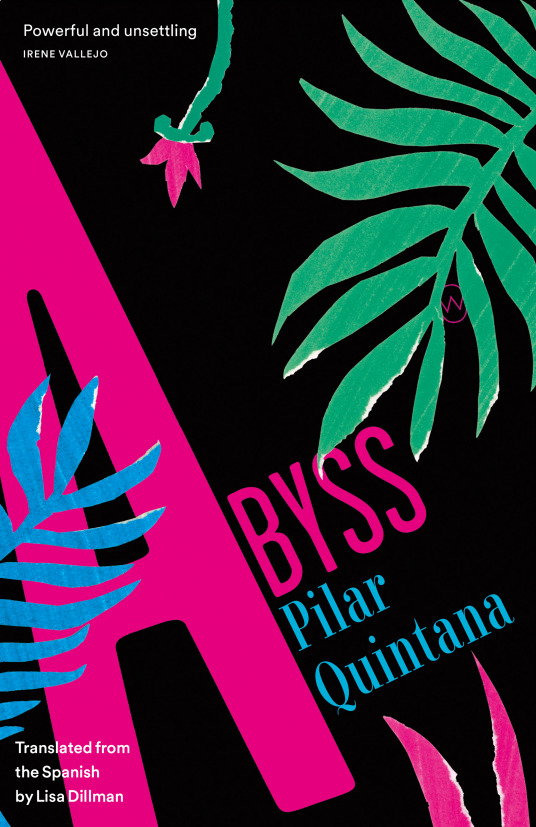
View On WordPress
0 notes
Photo
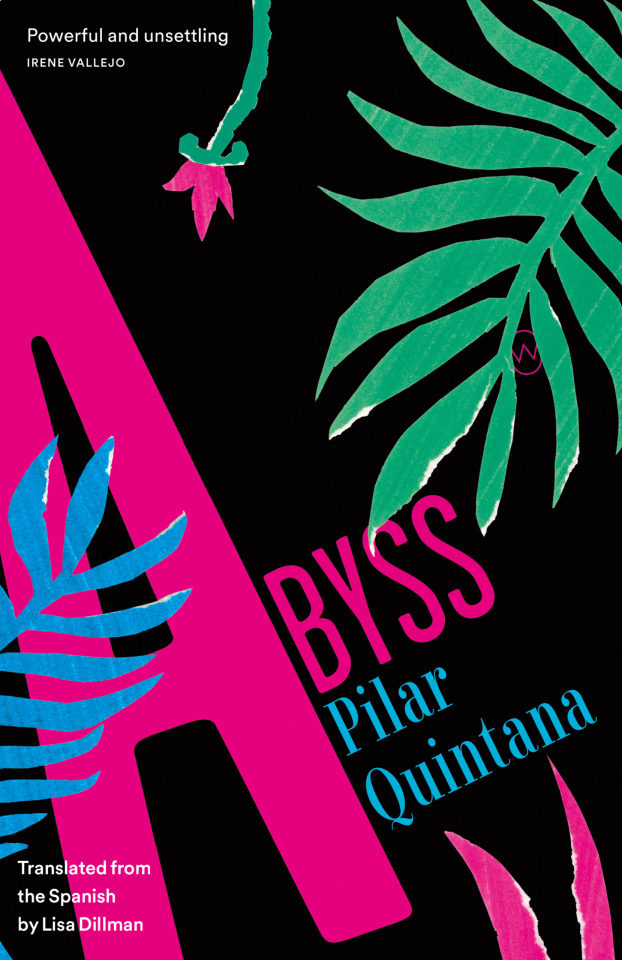
Abyss
By Pilar Quintana.
1 note
·
View note
Text
Oficializa federación y estados el IMSS-Bienestar
Oficializa federación y estados el IMSS-Bienestar
#PeriodismoParaTi #SociedadNoticias
#IMSS #IMSSBienestar @lopezobrador_ @GobiernoMX @Tu_IMSS
Asegura el gobierno de México que con esto se garantizará el acceso a servicios médicos de calidad, así como a los medicamentos en tiempo y forma.
Por Carlos Lara Moreno | Reportero
El gobierno federal y los gobiernos de los estados firmaron el convenio de colaboración para el establecimiento del IMSS-Bienestar.
En conferencia de prensa, el presidente Andrés Manuel López Obrador anunció que…

View On WordPress
#Acceso a la Información y Protección de Datos Personales (INAI).#Adrián Alcalá Méndez#AMLo#Baja California Sur Layda Sansores San Román#Baja California Víctor Manuel Castro Cosío#Campeche Rutilio Escandón Cadenas#Chiapas Indira Vizcaíno Silva#Ciudad de México Julio Menchaca Salazar#Colima Martí Batres Guadarrama#Dos Bocas#Estado de México Alfredo Ramírez Bedolla#Hidalgo Delfina Gómez Álvarez#INAI#Instituto Nacional de Transparencia#Marina del Pilar Ávila Olmeda#Michoacán Miguel Ángel Navarro Quintero#Nayarit Salomón Jara Cruz#Oaxaca Sergio Salomón Céspedes Peregrina#Puebla María Elena Lezama Espinosa#Quintana Roo Ricardo Gallardo Cardona#Refinería#San Luis Potosí Rubén Rocha Moya#Sinaloa Alfonso Durazo Montaño#SN#Sociedad#Sociedad Noticias#Sociedad-Noticias.com#sociedadNoticias#SociedadNoticias.com#Sonora Carlos Merino Campos
0 notes
Text
2023 in books: fiction edition
literary fiction published 2013-2023 (based on English translation)
The Employees by Olga Ravn (⭐⭐⭐⭐⭐)
Detransition Baby by Torrey Peters (⭐⭐⭐⭐⭐)
When We Cease to Understand the World by Benjamín Labatut (⭐⭐⭐⭐⭐)
There’s No Such Thing As an Easy Job by Kikuko Tsumura (⭐⭐⭐⭐⭐)
Human Acts by Han Kang (⭐⭐⭐⭐⭐)
Bunny by Mona Awad (⭐⭐⭐⭐⭐)
Frankissstein by Jeanette Winterson (⭐⭐⭐⭐⭐)
All Your Children Scattered by Beata Umubyeyi Mairesse (⭐⭐⭐⭐⭐)
Mister N by Najwa Barakat (⭐⭐⭐⭐⭐)
Fever Dream by Samanta Schweblin (⭐⭐⭐⭐)
Gideon the Ninth by Tamsyn Muir (⭐⭐⭐⭐)
Brickmakers by Selva Almada (⭐⭐⭐⭐)
True Biz by Sara Nović (⭐⭐⭐⭐)
Abyss by Pilar Quintana (⭐⭐⭐⭐)
The Meursault Investigation by Kamel Daoud (⭐⭐⭐⭐)
Frankenstein in Baghdad by Ahmed Saadawi (⭐⭐⭐⭐)
Spring Garden by Tomoka Shibasaki (⭐⭐⭐⭐)
Rombo by Esther Kinsky (⭐⭐⭐⭐)
Concerning My Daughter by Kim Hye-Jin (⭐⭐⭐⭐)
The House of Rust by Khadija Abdalla Bajaber (⭐⭐⭐⭐)
Men without Women by Haruki Murakami (⭐⭐⭐)
The Sky Above the Roof by Natacha Appanah (⭐⭐⭐)
Sweet Bean Paste by Durian Sukegawa (⭐⭐⭐)
Luster by Raven Leilani (⭐⭐⭐)
Solo Dance by Li Kotomi (⭐⭐⭐)
Untold Night and Day by Bae Suah (⭐⭐⭐)
The Shadow King by Maaza Mengiste (⭐⭐⭐)
The Deep by Rivers Solomon (⭐⭐⭐)
Afterlives by Abdurazak Gurnah (⭐⭐⭐)
Wreck the Halls by Tessa Bailey
Indelicacy by Amina Cain (⭐⭐⭐)
Out of Love by Hazel Hayes (⭐⭐⭐)
Freshwater by Akwaeke Emezi (⭐⭐⭐)
The Reactive by Masande Ntshanga (⭐⭐⭐)
The Houseguest: And Other Stories by Amparo Dávila (⭐⭐)
The Glutton by A.K. Blakemore (⭐⭐)
Homebodies by Tembe Denton-Hurst (⭐⭐)
Nervous System by Lina Meruane (⭐⭐)
Owlish by Dorothy Tse (⭐⭐)
The President and the Frog by Carolina de Robertis (⭐⭐)
The Magic of Discovery by Britt Andrews (⭐)
literary fiction published 1971-2012
House of Leaves by Mark Z. Danielewski (⭐⭐⭐⭐⭐)
The Vampire Lestat by Anne Rice (⭐⭐⭐⭐⭐)
Corregidora by Gayl Jones (⭐⭐⭐⭐⭐)
Signs Preceding the End of the World by Yuri Herrera (⭐⭐⭐⭐⭐)
Changes: A Love Story by Ama Ata Aidoo (⭐⭐⭐⭐⭐)
Open City by Teju Cole (⭐⭐⭐⭐⭐)
The Lover by Marguerite Duras (⭐⭐⭐⭐⭐)
Mild Vertigo by Mieko Kanai (⭐⭐⭐⭐⭐)
Abandon by Sangeeta Bandyopadhyay (⭐⭐⭐⭐⭐)
Toddler Hunting and Other Stories by Taeko Kōno (⭐⭐⭐⭐⭐)
Parable of the Sower by Octavia E. Butler (⭐⭐⭐⭐)
Elena Knows by Claudia Piñeiro (⭐⭐⭐⭐)
Ceremony by Leslie Marmon Silko (⭐⭐⭐⭐)
Perestroika by Tony Kushner *a play (⭐⭐⭐⭐)
Strange Weather in Tokyo by Hiromi Kawakami (⭐⭐⭐⭐)
By Night in Chile by Roberto Bolaño (⭐⭐⭐⭐)
Drive Your Plow over the Bones of the Dead by Olga Tokarczuk (⭐⭐⭐⭐)
Three Strong Women by Marie NDiaye (⭐⭐⭐⭐)
Kingdom Cons by Yuri Herrera (⭐⭐⭐⭐)
Paradise Rot by Jenny Hval (⭐⭐⭐⭐)
The God of Small Things by Arundhati Roy (⭐⭐⭐⭐)
A Mountain to the North, A Lake to the South, Paths to the West, a River to the East by Laszlo Krasznahorkai (⭐⭐⭐⭐)
Interview with the Vampire by Anne Rice (⭐⭐⭐⭐)
Queen Pokou by Véronique Tadjo (⭐⭐⭐)
The Private Lives of Trees by Alejandro Zambra (⭐⭐⭐)
The Hour of the Star by Clarice Lispector (⭐⭐⭐)
Sweet Days of Discipline by Fleur Jaeggy (⭐⭐⭐)
Mr. Potter by Jamaica Kincaid (⭐⭐⭐)
Bluebeard’s First Wife by Ha Seong-nan (⭐⭐⭐)
The Body Artist by Don DeLillo (⭐⭐⭐)
Glaciers by Alexis M. Smith (⭐⭐⭐)
Curtain by Agatha Christie (⭐⭐⭐)
The Iliac Crest by Cristina Rivera Garza (⭐⭐⭐)
My Name Is Red by Orhan Pamuk (⭐⭐⭐)
The Dovekeepers by Alice Hoffman (⭐⭐⭐)
Like Water for Chocolate by Laura Esquivel (⭐⭐⭐)
Rashomon and Seventeen Other Stories by Ryūnosuke Akutagawa (⭐⭐)
Coraline by Neil Gaiman (⭐⭐)
The End of the Moment We Had by Toshiki Okada (⭐⭐)
The Optimist’s Daughter by Eudora Welty (⭐)
literary fiction published start of time-1970
Catch-22 by Joseph Heller (⭐⭐⭐⭐⭐)
🔁 The Stranger by Albert Camus (⭐⭐⭐⭐⭐)
The Heart Is a Lonely Hunter by Carson McCullers (⭐⭐⭐⭐⭐)
🔁 One Hundred Years of Solitude by Gabriel García Márquez (⭐⭐⭐⭐⭐)
The Posthumous Memoirs of Brás Cubas by Machado de Assis (⭐⭐⭐⭐⭐)
Empty Wardrobes by Maria Judite de Carvalho (⭐⭐⭐⭐⭐)
Stoner by John Williams (⭐⭐⭐⭐⭐)
The Chandelier by Clarice Lispector (⭐⭐⭐⭐)
An Apprenticeship, or the Book of Pleasures by Clarice Lispector (⭐⭐⭐⭐)
The Woman in the Dunes by Kōbō Abe (⭐⭐⭐⭐)
As I Lay Dying by William Faulkner (⭐⭐⭐⭐)
Nightwood by Djuna Barnes (⭐⭐⭐⭐)
Dracula by Bram Stoker (⭐⭐⭐⭐)
Chess Story by Stefan Zweig (⭐⭐⭐⭐)
Aura by Carlos Fuentes (⭐⭐⭐⭐)
Fathers and Sons by Ivan Turgenev (⭐⭐⭐)
All Passion Spent by Vita Sackville-West (⭐⭐⭐)
The Hole by José Revueltas (⭐⭐⭐)
Baron Bagge by Alexander Lernet-Holenia (⭐⭐⭐)
Carmilla by J. Sheridan Le Fanu (⭐⭐)
Barabbas by Pär Lagerkvist (⭐)
11 notes
·
View notes
Text
"Ela queria fugir, se perder, não dizer nada a ninguém e ser engolida pela selva. Começou a correr, tropeçou, caiu, se levantou e correu de novo"
- Pilar Quintana
4 notes
·
View notes
Text
Palabras en castellano
Estrambote: Conjunto de versos estrafalarios que se agregan al final de una combinación métrica.
Estafermo: Figura giratoria de un hombre armado usado en los juegos caballerescos; persona que está parada como embobada.
Sayón: Verdugo; persona vestida con sábana larga para la procesión de Semana Santa.
Ufanar: Engreírse, jactarse.
Estofa: Tela o tejido de labores, por lo común de seda.
Besugo: Pez acantopterigio de color rosado y carne muy preciada; persona torpe o necia.
Orlado: Adornado.
Capcioso: Embustero o falso; trata de obtener una respuesta que comprometa a su interlocutor.
Llosa: Terreno agrícola cercado, próximo a la casa o barriada a que pertenece.
Superchería: Engaño o injuria.
Redivivo: Aparecido, resucitado.
Hórreo: Granero, lugar de almacenamiento de productos agrícolas.
Quintana: Puerta, vía o plaza en los campamentos romanos donde se vendían los víveres; en asturiano, el espacio frente a una o varias casas.
Lagar: Recipiente donde se pisa la uva para obtener el mosto; donde se prensan las uvas o manzanas; en las fábricas de salazón, depósito para el pescado en salmuera.
Pegollo: En asturiano, cada uno de los pilares de piedra o madera sobre el que se apoyan los hórreos.
Casero: Dueño de una casa; administrador de una casa; persona que cuida una casa y vive en ella, estando ausente el dueño.
Gañán: Mozo de labranza; hombre fuerte y rudo.
Zafio: Tosco o vulgar.
Veras: Realidad, verdad; efectividad, fervor o actividad con que se ejecuta algo.
Garrido: Gallardo o robusto; bien parecido, elegante.
Tegumento: Órgano que sirve de protección externa al cuerpo humano y de los animales, con varias capas y anejos como glándulas, escamas, pelo y plumas.
Ecdisis: Muda de los artrópodos.
Exuvio: Muda de los artrópodos.
Carballeda: Sitio poblado de caballos.
Arrobado: Peso por arrobas.
2 notes
·
View notes
Text
'Abyss' by Pilar Quintana – An Eight Year-Old Girl Watches Her Family
‘Abyss’ by Pilar Quintana (2021) – 219 pages Translated from the Spanish by Lisa Dillman
The story in ‘Abyss’ is told by an 8 year-old girl which makes it easy to follow. Children as young as eight can sense the undercurrents that are roiling beneath the surface in their family. They have a front row seat for observing marital discord. The daughter Claudia…
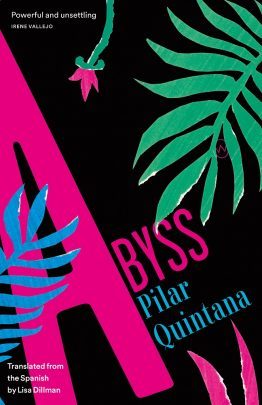
View On WordPress
0 notes
Text
The National Book Award finalists have been announced.

2023 Longlist for the National Book Award for Fiction:
Nana Kwame Adjei-Brenyah, Chain-Gang All-Stars Pantheon Books / Penguin Random House
Aaliyah Bilal, Temple Folk Simon & Schuster
Eliot Duncan, Ponyboy W. W. Norton & Company
Paul Harding, This Other Eden W. W. Norton & Company
Tania James, Loot Knopf / Penguin Random House
Jayne Anne Phillips, Night Watch Knopf / Penguin Random House
Mona Susan Power, A Council of Dolls Mariner Books / HarperCollins Publishers
Hanna Pylväinen, The End of Drum-Time Henry Holt and Company / Macmillan Publishers
Justin Torres, Blackouts Farrar, Straus and Giroux / Macmillan Publishers
LaToya Watkins, Holler, Child Tiny Reparations Books / Penguin Random House
2023 Longlist for the National Book Award for Nonfiction:
Ned Blackhawk, The Rediscovery of America: Native Peoples and the Unmaking of U.S. History Yale University Press
Jonathan Eig, King: A Life Farrar, Straus and Giroux / Macmillan Publishers
Viet Thanh Nguyen, A Man of Two Faces: A Memoir, A History, A Memorial Grove Press / Grove Atlantic
Prudence Peiffer, The Slip: The New York City Street That Changed American Art Forever Harper / HarperCollins Publishers
Donovan X. Ramsey, When Crack Was King: A People’s History of a Misunderstood Era One World / Penguin Random House
Cristina Rivera Garza, Liliana’s Invincible Summer: A Sister’s Search for Justice Hogarth / Penguin Random House
Christina Sharpe, Ordinary Notes Farrar, Straus and Giroux / Macmillan Publishers
Raja Shehadeh, We Could Have Been Friends, My Father and I: A Palestinian Memoir Other Press
John Vaillant, Fire Weather: A True Story from a Hotter World Knopf / Penguin Random House
Kidada E. Williams, I Saw Death Coming: A History of Terror and Survival in the War Against Reconstruction Bloomsbury Publishing
2023 Longlist for the National Book Award for Poetry:
John Lee Clark, How to Communicate W. W. Norton & Company
Oliver de la Paz, The Diaspora Sonnets Liveright / W. W. Norton & Company
Annelyse Gelman, Vexations University of Chicago Press
José Olivarez, Promises of Gold Henry Holt and Company / Macmillan Publishers
Craig Santos Perez, from unincorporated territory [åmot] Omnidawn Publishing
Paisley Rekdal, West: A Translation Copper Canyon Press
Brandon Som, Tripas Georgia Review Books / University of Georgia Press
Charif Shanahan, Trace Evidence Tin House Books
Evie Shockley, suddenly we Wesleyan University Press Monica Youn, From From Graywolf Press
2023 Longlist for the National Book Award for Translated Literature:
Juan Cárdenas, The Devil of the Provinces Translated from the Spanish by Lizzie Davis Coffee House Press
Bora Chung, Cursed Bunny Translated from the Korean by Anton Hur Algonquin Books / Hachette Book Group
David Diop, Beyond the Door of No Return Translated from the French by Sam Taylor Farrar, Straus and Giroux / Macmillan Publishers
Jenny Erpenbeck, Kairos Translated from the German by Michael Hofmann New Directions Publishing
Stênio Gardel, The Words That Remain Translated from the Portuguese by Bruna Dantas Lobato New Vessel Press
Khaled Khalifa, No One Prayed Over Their Graves Translated from the Arabic by Leri Price Farrar, Straus and Giroux / Macmillan Publishers
Fernanda Melchor, This Is Not Miami Translated from the Spanish by Sophie Hughes New Directions Publishing
Pilar Quintana, Abyss Translated from the Spanish by Lisa Dillman World Editions
Astrid Roemer, On a Woman’s Madness Translated from the Dutch by Lucy Scott Two Lines Press
Mohamed Mbougar Sarr, The Most Secret Memory of Men Translated from the French by Lara Vergnaud Other Press
2023 Longlist for the National Book Award for Young People’s Literature:
Erin Bow, Simon Sort of Says Disney-Hyperion Books / Disney Publishing Worldwide
Kenneth M. Cadow, Gather Candlewick Press
Alyson Derrick, Forget Me Not Simon & Schuster Books for Young Readers / Simon & Schuster
Huda Fahmy, Huda F Cares? Dial Books for Young Readers / Penguin Random House
Vashti Harrison, Big Little, Brown Books for Young Readers / Hachette Book Group
Katherine Marsh, The Lost Year: A Survival Story of the Ukrainian Famine Roaring Brook Press / Macmillan Publishers
Dan Nott, Hidden Systems: Water, Electricity, the Internet, and the Secrets Behind the Systems We Use Every Day Random House Graphic / Penguin Random House
Dan Santat, A First Time for Everything First Second / Macmillan Publishers
Betty C. Tang, Parachute Kids Graphix / Scholastic, Inc.
Yohuru Williams and Michael G. Long, More Than a Dream: The Radical March on Washington for Jobs and Freedom Farrar, Straus and Giroux Books for Young Readers / Macmillan Publishers
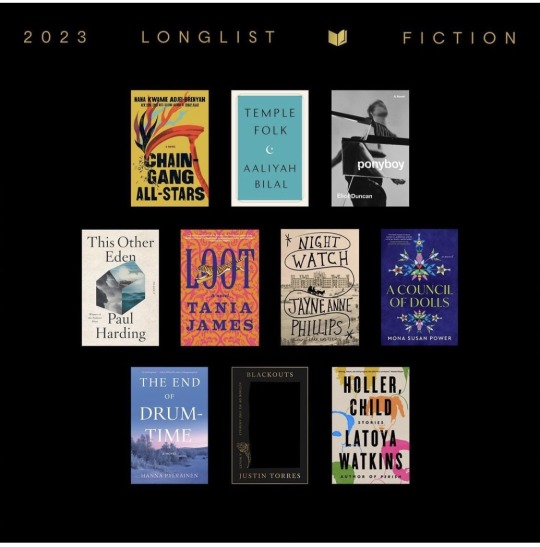
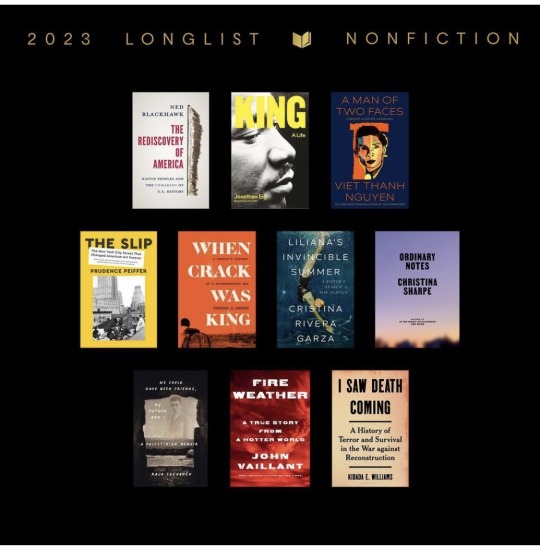
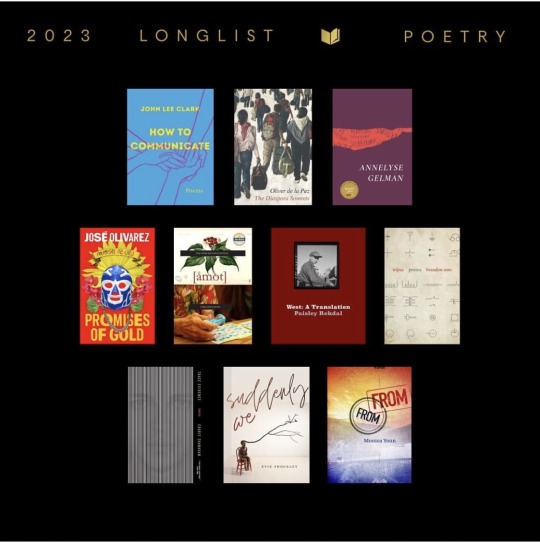
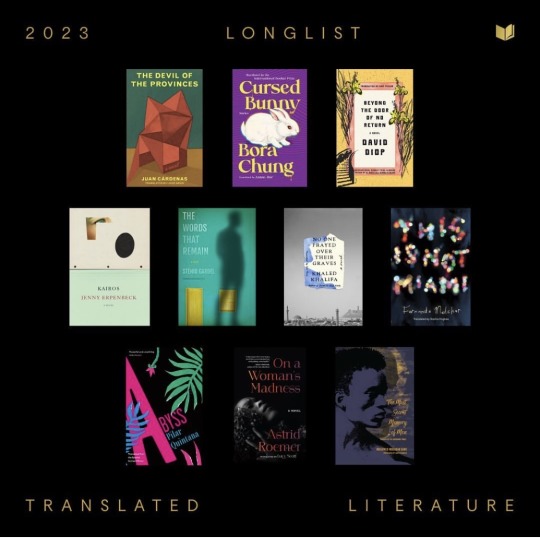

3 notes
·
View notes
Text
Em "Rinha de Galos", todos matam, ou morrem
Vem surgindo uma onda de novas escritoras latino-americanas que produzem uma literatura que chega ao obscurantismo. “A Cachorra”, da colombiana Pilar Quintana, é enigmático ao explorar uma mãe complexa; “Morra, Amor”, da argentina Ariana Harwicz, entra na mente doentia de uma mulher que está passando por uma crise em sua família; e “É sempre a hora de nossa morte amém”, da brasileira Mariana…
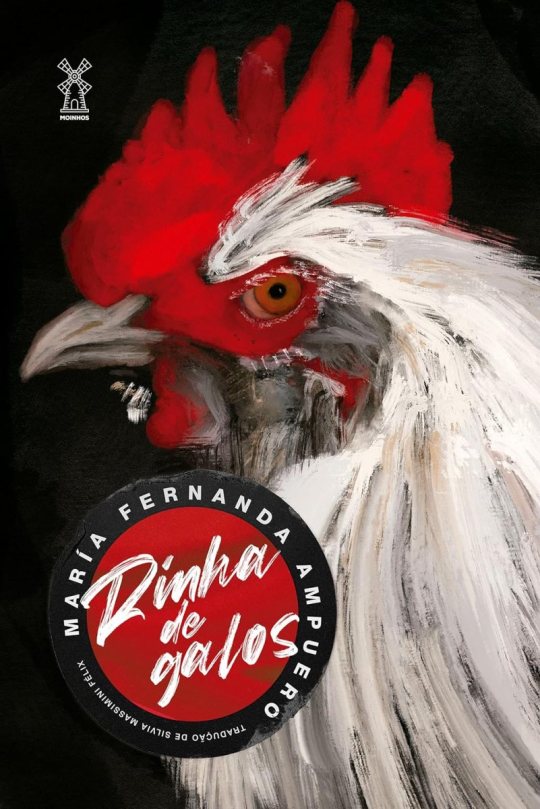
View On WordPress
#escritora equatoriana#home#horror#literatura#literatura latino-americana#maria fernanda ampuero#radical#terror#thriller
2 notes
·
View notes